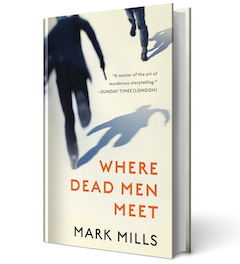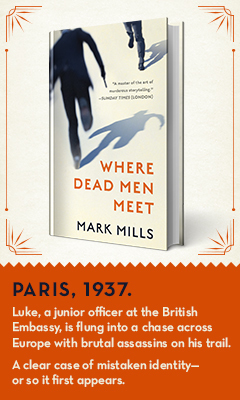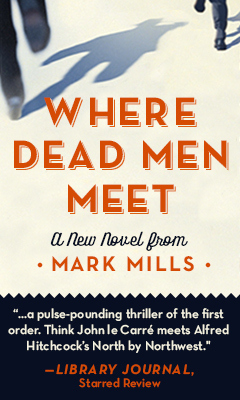Where Dead Men Meet
by Mark Mills
Reading Mark Mills's Where Dead Men Meet is like watching a classic Alfred Hitchcock movie, one with an expertly drawn everyman caught up in engrossing intrigue and on the run from dangerous spies and nefarious characters. Accompanied, of course, by a beautiful and possibly deadly dame. The opening is brutal and spiritual at the same time. In 1937 England, a nun is beaten to death, but she's the kind of person who "[steeps] herself in Christ's selfless Passion, living His suffering as best she could," so her last thought is that perhaps the violence inflicted upon her is "a test, a kind of penance, and... she would show herself equal to the suffering He had endured."
Cut to Paris, France, where Luke Hamilton works as a junior air intelligence officer at the British Embassy. He receives word of the murder of Sister Agnes, who raised him after he was orphaned as a baby 25 years earlier, until he was adopted. Even more distressing, he receives a note while dining out, stating that an assassin has Luke in his sights; minutes later, the veracity of the note is confirmed. Luckily, someone else in the restaurant is aware of the killer and saves Luke's life, telling him: "You must change your name, change everything. If you don't, they will find you and they will kill you. Nothing can protect you--not your family, not the police, not your government."
When Luke asks, "Why? What have I done?" his savior--himself a hit man--says Luke has done nothing, that it's a case of mistaken identity, but "people have died for less." This begins Luke's trek across Europe, taking him to Germany, Switzerland, Italy and Croatia. Along the way he meets Pippi, whom Luke's rescuer assures will be helpful, but things go roughly during their initial meeting. Trust is something Pippi doesn't give easily. Eventually Luke forms an uneasy alliance with her, thinking he might need the woman's particular set of skills to help him find out why someone wants him dead. But Pippi has her own agenda involving salvation and revenge, and becoming entangled in her plans might put Luke in even more danger.
Where Dead Men Meet is an adventurous, cinematic read, which isn't surprising since Mills is a former screenwriter. The visuals he creates are exceptionally vivid, putting readers right in the thick of the action and on location.
It's easy to imagine an actor similar to a young Jimmy Stewart or Joel McCrea playing Luke, an innocent who starts out not knowing why someone thinks he knows something he doesn't know, but becomes more resourceful as he learns how to survive and stay one step ahead of the bad guys. And picture someone like Veronica Lake or Joan Fontaine as Pippi, the mysterious woman who's steelier than she looks. She and Luke enjoy lively banter: "Love doesn't have to be requited to be real," Luke tells her. "Maybe the purest kind of love is the one that stands alone, by itself." When Pippi replies, "You don't believe that," Luke retorts, "And you have obviously never loved a cat." The two are a winning pair, and hopefully Mills will bring them back for future adventures.
The protagonists aren't the only memorable characters; the supporting ones--including the bad guys--leave indelible impressions, too. Borodin, the man who saves Luke's life, is perhaps one of the most sympathetic assassins in recent memory. There's no question Borodin is a lethal weapon, but his relationship with Luke and Pippi is surprisingly moving. Borodin's daughter, Simone, appears in one scene, and yet what she does is nothing short of extraordinary, as Pippi says. The killers gunning for Luke come in different shades of vicious--some are even civil--with motives ranging from a desire to avenge a family member's death to straight-up greed. Mills gives each character a full inner life, showing that even while people commit heinous acts, they could still believe they're doing the right thing.
Though the novel is set 80 years ago, Mills's observations about world events are timely and relevant. One character reminisces about an earlier period in Germany when "the land borders were still porous," but as war looks imminent, there's a "subtle shift in policy, the slow sealing-off of the country," and "a reckoning... with anyone foolish enough to challenge [the establishment]: journalists, authors, artists, and other undesirables." It's not hard to imagine how these passages could describe the current political climate.
But this isn't a political novel. It's smart entertainment, a suspenseful escapade across Europe with a dash of romance and involving characters who insist you come along for the unforgettable ride. --Elyse Dinh-McCrillis








